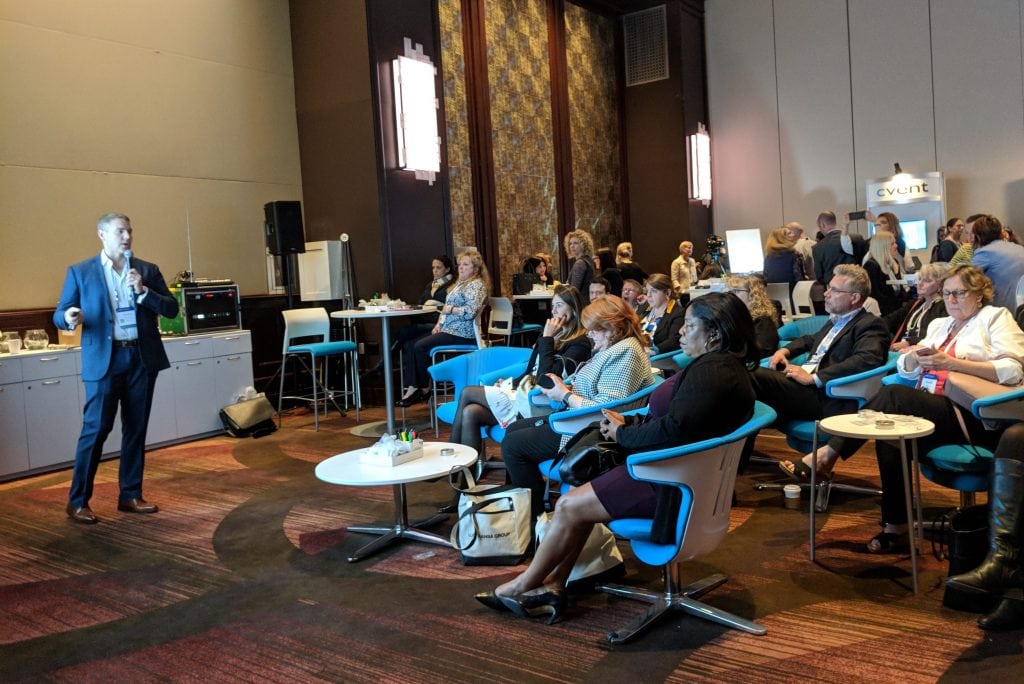Skift Take
It blows my mind that corporate travel executives say the same exact thing at this conference every year. It's like Groundhog Day with more suits and fewer laughs. Everyone wants to be one step ahead, but where is the incentive to actually take that step?
It’s easy to point out what’s broken in corporate travel, but it’s much harder to figure out how to fix it.
At the Association of Corporate Travel Executives (ACTE) Global Summit in New York City on Monday, the usual suspects from across the industry presented their thoughts on the technologies that will move the industry forward. As expected, a looming technological disruption will make the industry more connected and autonomous, even if no one quite knows how to get there.
As traveler behavior shifts and travel policy becomes more of a focal point for workers and their employers in a strong global economy, corporate travel giants should be taking advantage of their scale to gain an edge on competitors and create a better business travel experience in the process.
This year the buzzword big data seems to have morphed into personalization, although this smarter, more automated future remains at a distance. Machine learning, artificial intelligence, and neural nets are still kicking around as the business traveler experience remains the exact same year after year.
Pushing targeted content, deals, and incentives to travelers through mobile channels seems like a big opportunity. Why not remove all the guesswork a traveler goes through when booking?
“Searching for things and looking for them is absolutely ridiculous,” said Eric Bailey, global travel and venue group lead for Microsoft Procurement Group, during a panel. “Imagine if you had everything connected. This stuff will start coming to you.”
Fair enough, but even consumer travel sites haven’t really cracked this. Bailey also said that blockchain may become a powerful tool for travel managers, for a variety of reasons.
“We’re starting blockchain conversations with our suppliers,” said Bailey. “The challenge is we’re talking to an airline and we see blockchain could work for the reduction of costs, but it also could be a currency to use for frequent flyer points, or a way to get content or [connect information between different travel companies]. It’s all the same technology. What we’ve found is those four areas meet at the CEO, and the typical CEO is not looking at blockchain as a completely strategic thing across a whole organization.”
Bailey said Microsoft is experimenting with blockchain with one specific hotel using a “mockchain” to feel things out. Blockchain in corporate travel seems like a solution in search of a problem in most of these examples.
The bigger picture seems to be the inevitable merging of different data sources into a cohesive experience for business travelers and the managers that deal with them.
“It’s all about commoditizing the data you have and making them available to service partners; we’re now moving into the sharing data world,” said Johnny Thorsen, vice president of global travel strategy and partnerships of Mezi, on a panel. “Buyers need to learn to fail fast, because you need to try stuff and travel programs are not designed to fail fast. They spend three to five years in the same environment.”
Who can afford to fail, though, in an industry that rewards competence and stability instead of risk-taking? The innovation is coming from the bottom-up, in most cases, and these smaller players face a tough road against entrenched competition.
We’ve been tracking the consumerization of corporate travel, and the trend is impossible to ignore right now. Even if there is a new normal, at least in terms of understanding by stakeholders, the industry continues to shortchange business travelers by avoiding changes that present a potential risk to the status quo.
“The single most defining trend in our business is the consumerization of business travel,” said Evan Konwiser, vice president of digital traveler at American Express Global Business Travel, during a panel on the evolution of traveler behavior. “Our programs are looking more like business-to-consumer operations. More and more, work life and personal life are combining in the tools we use to execute our lives.”
The irony is that corporate travel companies have much more data available about travelers, ranging from spending habits on the road to behavioral insights, than consumer booking sites; this should position them to make major improvements to the business travel experience. So far, though, little has been done to leverage this position in a transformative manner.
Travel Managers Are Ambivalent About Change
Some new research announced during the conference also exposes the resistance many in the sector have towards experimentation.
ACTE and American Express Global Business Travel surveyed 200 business travel professionals in March about business traveler behavior and the problems they face with their programs.
Among those polled, 38 percent said their program suffers because of a lack of travel content, while 47 percent feel allowing travelers to book across multiple channels will weaken their program, while 20 percent think it will be beneficial.
More travelers are asking to include leisure travel in their business trip as well; 37 percent polled said they’d received increased inquiries about work-life balance; and 36 percent reported seeing an increase in travelers looking to combine leisure and business travel.
For all the talk about the importance of technology and the importance of innovation to the sector, the survey indicates travel managers don’t actually care. Just 36 percent of them said they plan to upgrade their technology.
The Daily Newsletter
Our daily coverage of the global travel industry. Written by editors and analysts from across Skift’s brands.
Have a confidential tip for Skift? Get in touch
Tags: acte, blockchain, business travel, ctir
Photo credit: Personalization was the buzzword this year at the Association of Corporate Travel Executives' summit in New York City on April 30, 2018. Jeremy Prout, regional security manager, International SOS and Control Risks, addressed attendees. Skift
